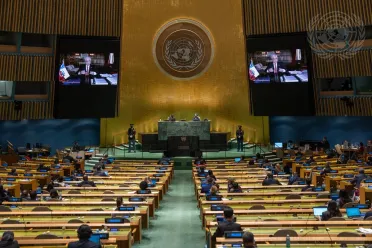Statement
Statement summary
SEBASTIÁN PIÑERA ECHENIQUE, President of Chile, said the decisions or shortcomings of today will define the world’s trajectory for generations. “Multilateralism is under pressure, and there is a need to reform our international architecture,” he said. Despite warnings of pandemics, COVID-19 was able to take the planet by surprise, overwhelming fragile health-care systems. Medical personnel stepped up around the globe, often putting their lives at risk to save others. Paying tribute to those on the frontlines, he said when forces of innovation and creativity are deployed, incredible results follow. We went from having no information about COVID-19 to having vaccines available in just 10 months. However, that great triumph of science contrasts with a “great political failure” as individualism and isolation failed in the latter.
Lessons included humility; solidarity; cooperation in addressing global problems; and the determination to listen to the voices of scientist and experts, he continued. In Chile, he outlined a health protection network which tripled the number of hospital beds available, cared for the sick and broadened the diagnostic network and the use of scientific criteria without political considerations. The population is largely vaccinated, and the country made significant donations of doses to other Latin American countries, and Chile along with other nations is supporting WHO’s efforts to conclude a treaty for preparedness and response to future pandemics. Drawing attention to the socioeconomic impacts of the COVID-19 crisis, along with spikes in national debt, he said it has also expanded the gender gap and exacerbated power struggles between the world’s major powers.
Against that backdrop, public policy decisions should be based on responsible, serious macroeconomic policies, he said. New digital technologies should be embraced broadly, and their benefits shared equally. Noting that the pandemic has drastically changed the world’s ways of working and learning, he said “these changes are here to stay”, and Chile is working to harness them. It had among the largest social protection packages in the world during the pandemic, channelling billions in direct transfers for almost 16 million citizens. Following a 5.8 per cent GDP decline in 2020, Chile’s economy is expected to grow by 10 per cent in 2021. Warning that “climate change has not been in quarantine” — with the climate crisis wreaking havoc even as societies were locked down against the virus — he cautioned against allowing the crisis from becoming a “climate apocalypse” and outlined Chile’s national and international efforts to that end.
Cautioning against the erosion of democratic institutions and the rule of law, he said the cancers of polarization and fragmentation have injected intolerance into many societies around the globe and must be combated. Some of the greatest threats emanate from Governments that were initially democratically elected, but which later co-opted institutions and crushed opposition parties, rendering them illegitimate. In an effort to improve its own system, Chile has planned a Constitutional Convention to draw up a new governing document that will build greater equity into society and protect Chilean values. At the global level, he added that new mechanisms are needed to achieve the right balance, free from exploitation and the use of vetoes. The global community should also unite to protect the rights and freedoms of Afghan women, he added.
Full statement
Read the full statement, in PDF format.
Photo

Previous sessions
Access the statements from previous sessions.
